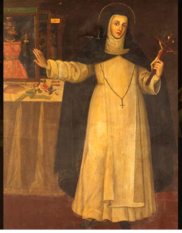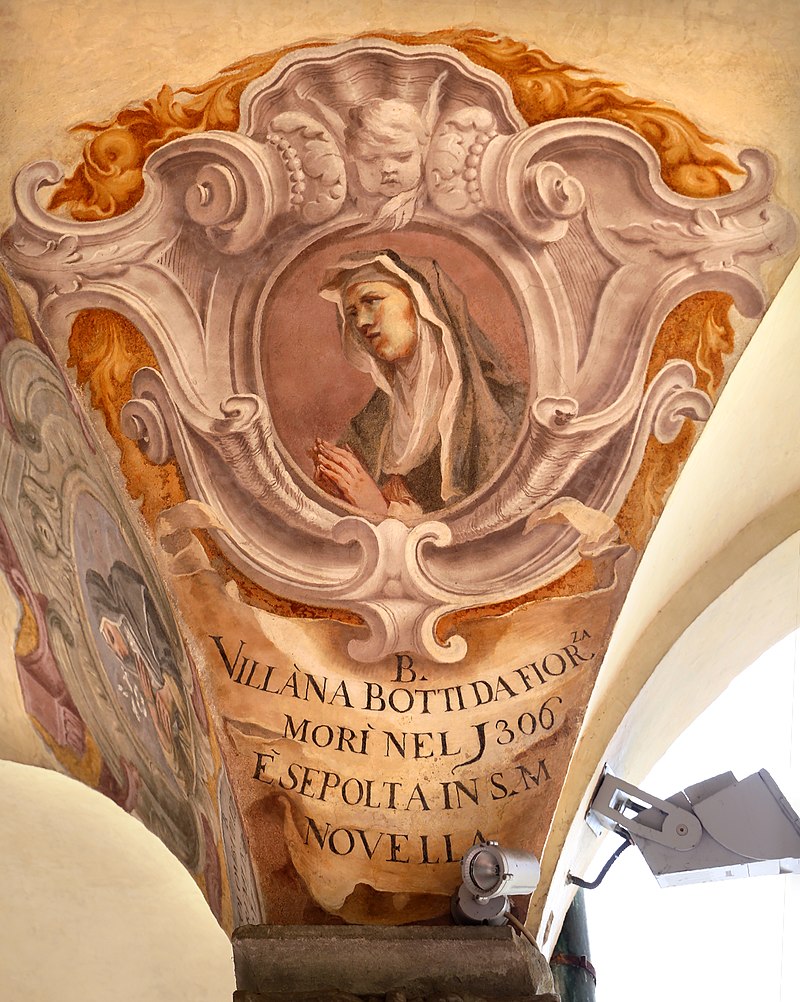dominican saints
Bl. Villana de Botti, Matron, O.P.
Feast Day February 28th

Born: 1332 in Florence, Italy
Died: December 1360 of natural causes; body taken to Santa Maria Novella; the Fathers were unable to bury her for a month due to the constant crowd of mourners
Beatified: March 27 1824 (cultus confirmed) by Pope Leo XII
Patronage: Married couples & Dominican tertiaries
Blessed Villana was the daughter of Andrew de’Botti, a Florentine merchant, and was born in 1332. When she was thirteen she ran away from home to enter a convent but her attempts were unsuccessful and she was forced to return. To prevent any repetition of her flight, her father shortly afterwards gave her in marriage to Rosso di Piero. After her marriage she appeared completely changed; she gave herself up to pleasure and dissipation and lived a wholly idle and worldly life. One day, as she was about to start for an entertainment clad in a gorgeous dress adorned with pearls and precious stones, she looked at herself in a mirror. To her dismay, the reflection that met her eyes was that of a hideous demon. A second and a third mirror showed the same ugly form.
Thoroughly alarmed and recognizing in the reflection the image of herself sin-stained soul, she tore off her fine attire and, clad in the simplest clothes she could find, she betook herself weeping to the Dominican Fathers at Santa Maria Novella to make a full confession and to ask absolution and help. This proved the turning point of her life, and she never again fell away. Before long Villana was admitted to the Third Order of St. Dominic, and after this she advanced rapidly in the spiritual life. Fulfilling all her duties as a married woman, she spent all her available time in prayer and reading. She particularly loved to read St. Paul’s Epistles and the lives of the saints. At one time, in a self-abasement and in her love for the poor, she would have gone begging for them from door to door had not her husband and parents interposed. So completely did she give herself up to God that she was often rapt in ecstasy, particularly during Mass or at spiritual conferences; but she had to pass through a period of persecution when she was cruelly calumniated and her honor was assailed.
Her soul was also purified by strong pains and by great bodily weakness. However, she passed unscathed through all these trials and was rewarded by wonderful visions and colloquies with our Lady and other saints. Occasionally the room in which she dwelt was filled with supernatural light, and she was also endowed with the gift of prophecy. As she lay on her deathbed, she asked that the Passion should be read to her, and at the words “He bowed His head and gave up the ghost”, she crossed her hands on her breast and passed away. Her body was taken to Santa Maria Novella, where it became such an object of veneration that for over a month it was impossible to proceed with the funeral.
People struggled to obtain shreds of her clothing, and she was honored as a saint from the day of her death. Her bereaved husband use to say that, when he felt discouraged and depressed, he found strength by visiting the room in which his beloved wife had died.


Bl. Villana de Botti
Taken from “Short Lives of the Dominican Saints” (London, Kegan Paul, Trench, and Trübner & Co., Ltd., 1901)
Villana was a member of the noble family De Botti and was born in Florence. Her childhood was spent in acts of astonishing devotion and in the exercise of austerities such as are rarely practiced even by persons advanced in age and virtue. She ardently desired to embrace the religious life; but, over-persuaded by her parents, she at length consented to marry and her nuptials were celebrated with the utmost magnificence.
Possibly her early piety may have had in it some tinge of pride, which necessarily led to a fall. Be this as it may, immediately on her marriage she abandoned all her exercises of prayer and penance and gave herself
up to a life of heartless and sinful dissipation. How long this lasted we are not told; but God, who had chosen her for Himself, at length recalled her to better things in a wonderful manner.
One-night Villana was preparing for an entertainment of unwonted splendor. She was dressed with all the sumptuous extravagance of the times; jewels sparkled in her hair, on her arms, on her very shoes. Before leaving her room, she went to cast one parting glance at the mirror. But, instead of the dazzling image of her own beauty, a horrible spectacle met her eyes. God had permitted that the deformity of the soul within should become visible on the outward person. Her hair, bound with gold and jeweled chains, she beheld transformed into a mass of coiled and venomous serpents; her fair face was darkened into that of a hideous negro; her eyes were red and fiery, and, instead of her beautiful mouth and ivory teeth, there grinned the open jaws of a monster of hell. Then Villana’s heart opened to know where and whence she had fallen. She tore the jewels from her hair and left her palace, not for the gay entertainment that awaited her, but for the neighboring church of the Dominicans, where, flinging herself at the feet of a holy Friar, she made, amidst tears of contrition, the confession of her life.
She returned home to enter upon a rigorous course of penance, which continued until her death. To atone for her past vanity and to honor the poverty of her Divine Master, she thenceforth wore only poor and shabby garments, and she divided her time between exercises of prayer and austerity and the care of the indigent. She earnestly desired to retire to a hermitage; her confessor, however, would not permit her to do this, but he gave her the habit of the Third Order. Trampling under foot all human respect, she wished to go from door-to-door begging alms for her beloved poor, and she only relinquished this intention in obedience to the will of her husband. She had thoroughly realized the presence of Our Lord in the person of His poor; and this truth was yet more vividly brought home to her by a miraculous incident. One day, as she was returning from church, she found a poor sick beggar lying in a miserable condition in the street. Taking him in her arms and gathering superhuman strength from her charity, Villana carried him to one of the public hospitals and laid him on a bed, whilst she went to seek the necessary remedies. On her return, the bed was empty, and the most careful inquiries failed to discover any traces of the sick beggar, who was always believed to have been our Divine Lord Himself.
On one occasion, when she had had a fierce encounter with the devil, Saint Catharine the Martyr appeared to her with a beautiful crown in her hand, saying, “Be constant, my daughter, and behold the magnificent reward which awaits thee in heaven.” This vision was regarded by Villana as a presage of her approaching death. From that time her sufferings and maladies increased and with them her thirst to endure yet more for the Beloved of her soul. “No, Lord,” she once exclaimed when she felt better, “I do not ask for any alleviation of my sufferings but rather that they may be increased.”
Having received the Last Sacraments with great devotion, she begged to have the Passion of Our Lord read to her, and at the words, “Bowing His head He gave up the ghost,” she placidly expired, in 1360. When the Sisters of the Third Order prepared the body for burial it became resplendent with beauty, and emitted such dazzling rays of light that they could not fix their eyes upon it. To satisfy the devotion of the people it was left unburied for the space of thirty-seven days and was still perfectly incorrupt when laid in the tomb. Villana appeared after her death to some holy women who were spending the night in prayer, and, in answer to their inquiries, she said, “Call me no longer Villana; now that I am in heaven I am called Margaret or the Pearl.” She was beatified by Leo XII, 1829.
Prayer
O God, who didst mercifully call back Thy handmaid, the Blessed Villana, from the snares of the world, causing her to pass through all the ways of humility and penance, grant, through her intercession, that we, confessing our guilt, may find forgiveness with Thee. Through Christ our Lord. Amen.
Prayers/Commemorations
First Vespers:
Ant: Come, O My chosen one, and I will place My throne in thee, for the King hath exceedingly desired thy beauty.
V. Pray for us, Blessed Villana.
R. That we may be made worthy of the promises of Christ.
Lauds:
Ant: She hath opened her hands to the needy, her palms she hath extended to the poor; fortitude and beauty are her vesture, and she shall rejoice on the last day.
V. God hath chosen her, and preferred her.
R. He maketh her to dwell in His tabernacle
Second Vespers:
Ant. She hath girded her loins, with courage and hath strengthened her arms: she hath tasted and seen, for her occupation is good: her lamp shall not be put out in the night.
V. Pray for us, Blessed Villana
R. That we may be made worthy of the promises of Christ.
Prayer:
Let us Pray: O God who didst deign to grant the Blessed Villana constantly to contemplate Thee with a right might, while being at the same time solicitous for the neighbor’s welfare, make us, through her intercession, diligently to attend to heavenly things and to exercise our charity by pious works. Through Christ our Lord.
R. Amen.
Prayer II:
O God, our merciful Father, you called Blessed Villana back from the emptiness of the world and aroused in her a spirit of humility and true penitence. Recreate in our hearts the power of your love and, filled by that same spirit, may we serve you in newness of life. We ask this through our Lord Jesus Christ, your Son, who lives and reigns with you and the Holy Ghost, one God, for ever and ever. – General Calendar of the Order of Preachers